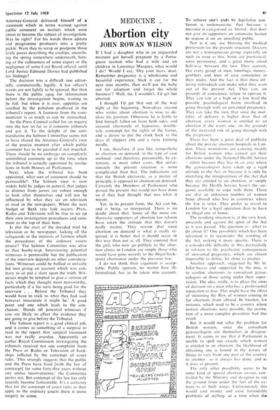MEDICINE
Abortion city
JOHN ROWAN WILSON
If I had a daughter who in an unguarded moment got herself pregnant by a Portu- guese seaman who had a wife and six children in Lourenco Marques, what would I do? Would I say, 'Dry your tears, dear. Remember pregnancy is a wholesome and beautiful experience. Stick it out for the next nine months, then we'll put the baby out for adoption and forget the whole business'? Well, no, I wouldn't. I'd get her aborted.
I thought I'd get that out of the way right at the beginning. Nowadays anyone who writes about abortion is wise to de- clare his position. Otherwise he is liable to find himself fallen on from both sides, and accused alternately of hypocrisy, double- talk, contempt for the rights of the foetus, and a desire to put the clock back to the days of slippery elm and a rusty knitting needle. I am, therefore, if you like, sympathetic to abortion on demand, in the type of case outlined--and therefore, presumably, by ex- tension, in most other cases. But unfor- tunately the present situation is more complicated than that. The indications are that the British electorate, as a matter of principle, is opposed to abortion on demand. Certainly the Members of Parliament who passed the present Act would not have done so if they had thought that was what it meant. Yet, in its present form, the Act can be, and is being, so interpreted. There is no doubt about that. Some of the more en- thusiastic supporters of abortion law reform have taken the attitude that this doesn't really matter. They reason that since abortion on demand is what is really re- quired, it is better that it should occur in this way than not at all. They contend that the girls who now go publicly to the abor- tion clinics in London are simply those who would have gone secretly to the illegal back- street abortionist under the previous law. I do not think their argument is accep- table. Public opinion, no matter how ill- formulated, has to be taken into account. To achieve one's ends by legislative con- fusion is undemocratic. Just because a measure is categorised as 'liberal% that does not give its supporters an automatic licence to impose it on an unwilling public. Nor is it any use blaming the medical profession for the present situation. Doctors are not a homogeneous group. especially on such an issue as this. Some are puritanical, some permissive, and a great many about half-way between the two. They contain, like every group of men, humbugs, money- grubbers and men of easy conscience in their midst. And the fact is that these dif- fering individuals can make what they want out of the present Act. They can, on grounds of conscience, refuse to operate it. They can rate at a high or a low level the possible psychological harm involved in going through with an unwanted pregnancy. They can take the view that since the mor- tality of delivery is higher than that of abortion, every woman is entitled to an abortion if she wants one, on the grounds of the increased risk of going through with the pregnancy. There has been a great deal of publicity about the private abortion hospitals in Lon- don. These institutions are catering mainly for British women who cannot get their abortions under the National Health Service —either because they use in an area where the gynaecologists have taken up a rigid attitude to the Act, or because it is only by stretching the interpretation of the Act that they are entitled to an abortion, or simply because the Health Service hasn't the sur- geons available to cope with them. There are also an unknown number of women from abroad who live in countries where the law is strict. They prefer to travel to London for a legal operation than to have an illegal one at home. The resulting situation is, at the very least, unseemly and against the spirit of the Act as it was passed. The question is: what to do about it? One possibility which has been advanced is to reconsider the wording of the Act, making it more specific. There is a considerable dilliculty in this, particularly in relation to the psychiatric consequences of unwanted pregnancy, which are almost impossible to define, let alone to predict. Another approach, suggested by Mr St. John-Stevas and supported by the BMA, is to confine abortions to consultant gynae- cologists or those acting under their super- vision. The idea, really, is to place the onus of decision on a man who has a professional reputation to lose. This might have the effect of stemming the flow of women coming in for abortions from abroad. In Sweden, for instance, which used to be a country where instant abortions were possible, the institu- tion of a more complex procedure had this result.
But it would not solve the problem for British women, since the consultant gynaecologists are themselves in disagree- ment. It seems to me that if Parliament is unable to spell out exactly which woman is entitled to an abortion, the likelihood of obtaining one is bound in the nature of things to vary from one part of the country to another- as it always has done, and-as it does at present. The only other possibility seems to be some kind of special abortion service, con- trolled by the Ministry and designed to cut the ground from under the feet of the ex- tremists of both wings. Unfortunately this would cost money and raise formidable problems of staffing, at a time when the Health Service is already in difficulty on both counts. The reason why Mr Crossman is against interfering with the Act is not because he thinks it is perfect. He is simply afraid that any steps he takes may lead him even more deeply into the morass.



































 Previous page
Previous page